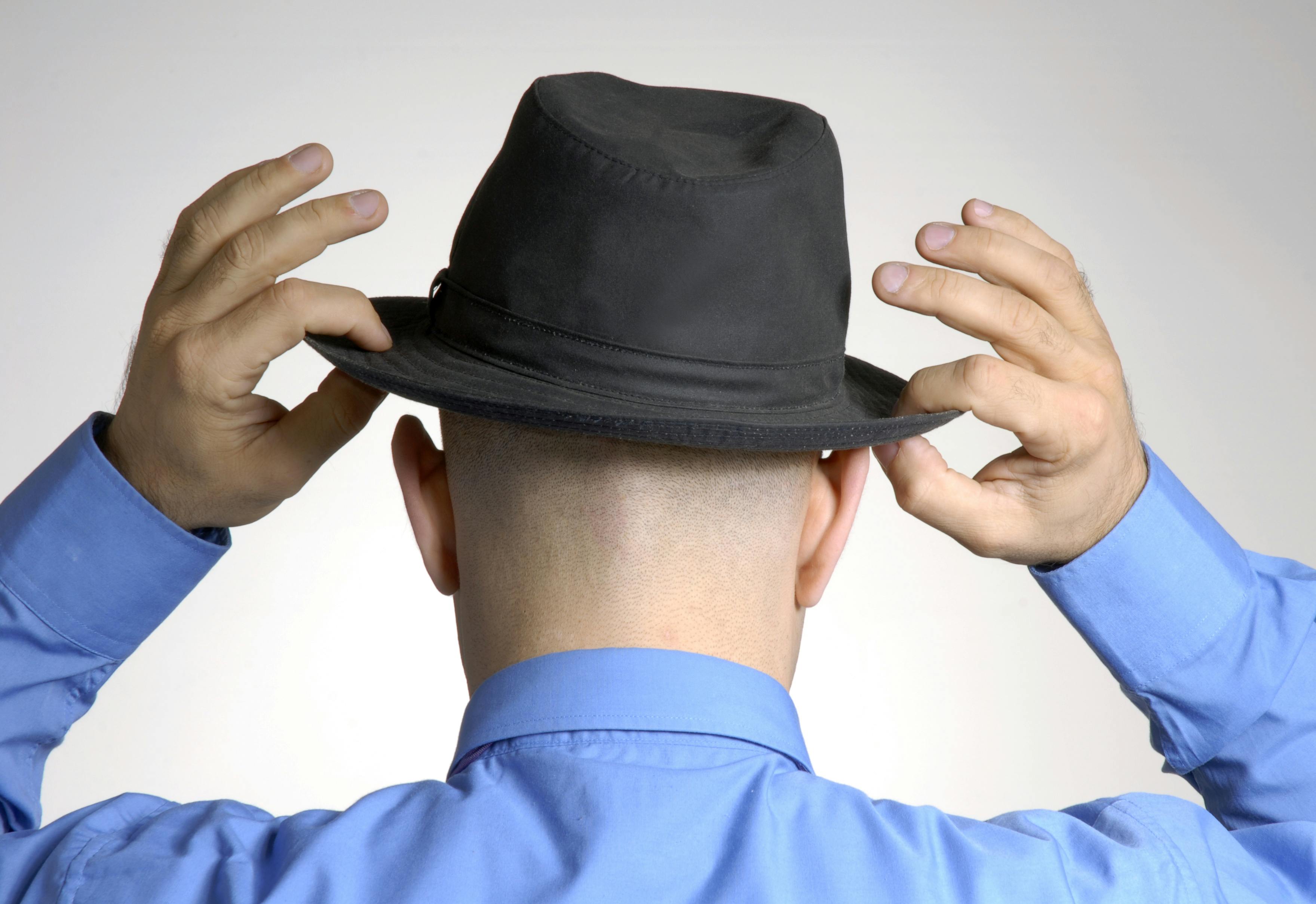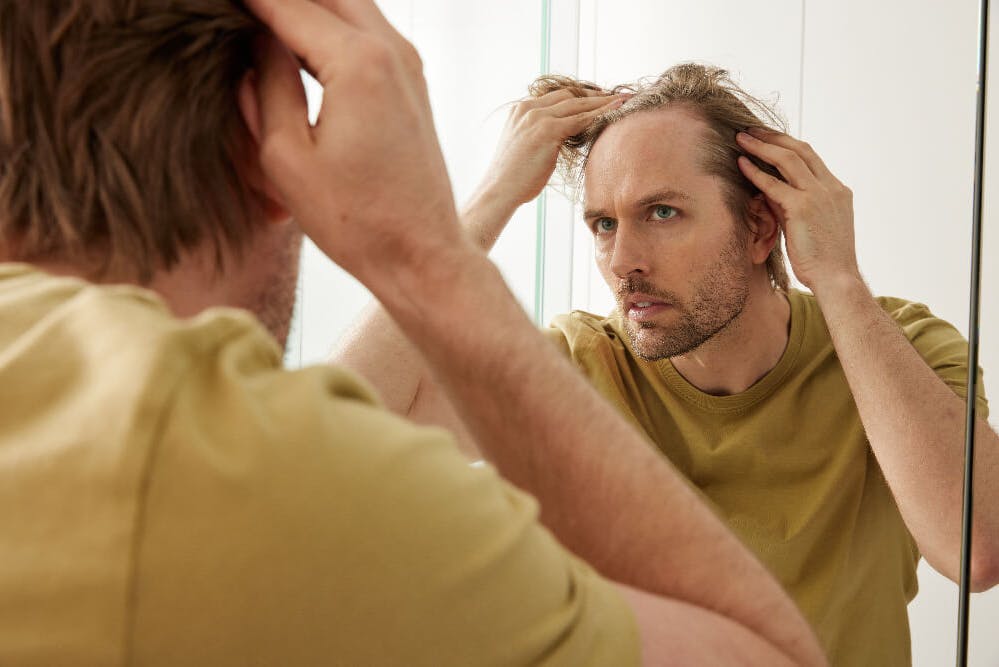


To wear a hat, or not to wear a hat? That is the question if you're worried your hat is causing hair loss, especially if you're also experiencing thinning hair and considering hair thinning treatment.
The link between wearing hats and hair loss has been a topic of discussion for years. Some believe that wearing a cap regularly might contribute to thinning hair or even baldness, while others suggest that hats might protect hair. But what's the truth behind this common question? Let's explore the science, expert insights, and real factors behind hair loss.
The belief that wearing hats can cause baldness has persisted for decades. This idea likely originated because many men experiencing hair loss often use hats to cover up their thinning hair. But correlation doesn’t equal causation. Just because many bald men wear hats doesn’t mean hats cause hair loss!
It seems studies are varied when it comes to cap wearing and baldness. Some seem to suggest that there might be a link, some don’t find a link and some even go as far to suggest that wearing a cap might prevent hair loss.
“This is a tough question to answer because the topic has not been well-studied,” dermatologist John Anthony tells the Cleveland Clinic [1]
A groundbreaking study published in Plastic and Reconstructive Surgery studied 92 pairs of identical male twins to explore factors contributing to male pattern baldness [2]. This study provided insights into the relationship between hats and hair loss:

While the study provides valuable data, dermatologists emphasise that the fit and style of a hat can matter.
Dr. John Anthony of the Cleveland Clinic mentions that wearing very tight hats could lead to potentially decrease blood flow to hair follicles, stressing them and leading to temporary hair loss, which might become permanent with continued wear. However, this is more related to tightness and prolonged wear rather than wearing a hat in general [1].
“We think it’s possible that wearing hats that are very tight — or very hot — could decrease blood flow to the hair follicles, stressing them and causing them to fall out. The hair loss would be temporary at first, but it could progress to permanent hair loss over time.”
Another theory of why hats cause baldness in some could be due to traction alopecia [3], which is a type of hair loss that is caused when excessive tension is put on the hair follicles, causing hair loss, usually associated with tight braids.
Dr. Michael Wolfeld, a plastic surgeon specialising in hair restoration and assistant clinical professor at Mount Sinai Medical Center in New York City, adds that traction alopecia—hair loss caused by continuous tension on hair follicles—can occur from wearing extremely tight hats. This type of hair loss is typically seen with tight braids or headgear but could happen with hats if worn too tight for extended periods. In an interview with Time Magazine, Dr.
Michael Wofeld said [4]:
“I think that if someone were to wear a hat very tight and for long periods of time—[every day, for months or years in a row]—that could cause some damage to the hair,”
“Over a period of years, that tension can cause hair to fall out. Most people probably don’t wear a hat so tightly that it could create this kind of tension.”
“Tightness is subjective, but if your hat is so tight that it’s leaving a prominent mark or indentation in your skin, you may want to find a looser lid.”
Male pattern baldness, or androgenetic alopecia, is mainly influenced by genetic, hormonal, and lifestyle factors. Here's a breakdown of these elements [5]:
Family history remains the strongest predictor of hair loss. Male pattern baldness, also known as androgenic alopecia (AGA) is determined by genetics in some respect [6]. According to one study [6], baldness is found on the X chromosome –which is inherited from the mother’s side, as women have XX and men have XY chromosomes
The hormone Dihydrotestosterone (DHT), derived from testosterone, plays a significant role in hair loss, especially in men [7]. In men, it drives changes during puberty, has an impact on body hair, penis growth, muscle growth and it deepens voices. It also helps regulate your mood and stimulate your sex drive. Overproduction of DHT can cause undesirable health effects in men, such as an enlarged prostate as well as male pattern baldness.
Conditions like autoimmune diseases, thyroid disease, vitamin deficiencies or cancer can contribute to hair thinning [8].
Smoking can also affect hair loss. Studies show that smoking can increase the risk of hair loss due to inflammation caused by nicotine [9].
Nicotine found in cigarettes releases cytokines, proteins that increase inflammation and can lead to the hair follicles being scared. This may make your hair more brittle and prone to falling out.
A study published in the journal Nutrients [10] found that consuming sugary drinks more frequently may be linked to increased hair thinning in younger men.
Sugar is believed to impact the way in which the hair follicle shreds and regrows hair. However, more research needs to be done.
Excess body weight has been linked to more severe cases of alopecia due to potential nutritional imbalances. Having a higher BMI might be linked to having a lower level of zinc in the hair, which helps stimulate hair growth [11].
Prolonged stress can push hair follicles into a resting phase, slowing hair regrowth and contributing to thinning [12].
While wearing a hat isn’t likely to be the main cause of hair loss, following these best practices can help:
The evidence suggests that wearing hats does not directly cause hair loss. In fact, hats might even offer some protection from environmental factors like UV rays. Male pattern baldness is primarily driven by genetics, hormones, and lifestyle choices. If you're noticing hair thinning or receding hairlines, it's best to consult a dermatologist or trichologist for personalised advice.
If you're searching for the best online hair regrowth treatments, Mosh offers one of Australia's top hair loss treatments, tailored to your individual needs by certified health practitioners.
With a variety of options, from medications to topical treatments, and access to medical professionals for guidance, you can find the right plan to regain confidence in your hair.
Apart from hair loss, Mosh also provides tailored treatment plans for weight loss, skincare, and sexual health—supporting you in enhancing your overall wellness from the comfort of your home.












Ready to Treat Hair Loss?